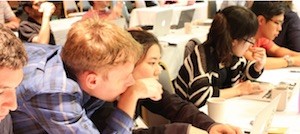 Argonne will host their 2015 ATPESC Training Program on Extreme-Scale Computing for computational scientists. The event takes place August 2-14 in Chicago.
Argonne will host their 2015 ATPESC Training Program on Extreme-Scale Computing for computational scientists. The event takes place August 2-14 in Chicago.
The program provides intensive hands-on training on the key skills, approaches and tools to design, implement, and execute computational science and engineering applications on current supercomputers and the HPC systems of the future. As a bridge to that future, this two-week program to be held at the Pheasant Run Resort in suburban Chicago fills many gaps that exist in the training computational scientists typically receive through formal education or shorter courses.
With the challenges posed by the architecture and software environments of today’s most powerful supercomputers, and even greater complexity on the horizon from next-generation and exascale systems, there is a critical need for specialized, in-depth training for the computational scientists poised to facilitate breakthrough science and engineering using these amazing resources.
Renowned scientists, HPC experts and leaders will serve as lecturers and will guide the hands-on laboratory sessions. The core curriculum will address:
- Computer architectures and their predicted evolution
Programming methodologies effective across a variety of today’s supercomputers and that are expected to be applicable to exascale systems - Approaches for performance portability among current and future architectures
- Numerical algorithms and mathematical software
- Performance measurement and debugging tools
- Data analysis, visualization, and methodologies and tools for Big Data applications
- Approaches to building community codes for HPC systems
Applications are due April 3. Doctoral students, postdocs, and computational scientists interested in attending ATPESC can review eligibility and application details on the event website.
In this video from ATPESC 2014, Rachana Ananthakrishnan from the University of Chicago presents: Managing Data Using Globus.
Download the Slides (PDF) * Sign up for our insideHPC Newsletter.




